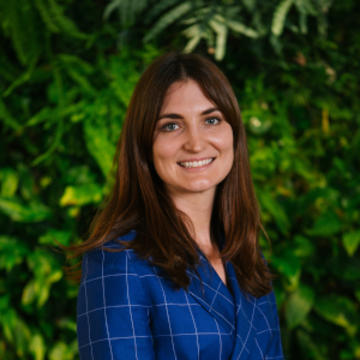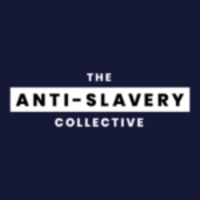Julia de Boinville, co-founder of The Anti-Slavery Collective

Julia de Boinville is the co-founder of The Anti-Slavery Collective . Together with her co-founder, they established the organisation in 2017, and their mission is to raise awareness of human trafficking as a global epidemic, convening changemakers, and highlighting the amazing work of the movement. They endeavour to become one of the largest global platforms for information and collaboration in the anti-slavery movement. Alongside this, Julia is also Head of External Affairs and Sales Enablement at Afiniti, a multinational AI and data analytics company. Afiniti transforms the way humans interact by applying artificial intelligence to discover, predict and affect patterns of interpersonal behaviour. Julia has a global role and looks after senior clients, the advisory board, business development and sales enablement.
What is your background? What made you decide to get involved in becoming an entrepreneur?
I suppose co-founding The Anti-Slavery Collective was entrepreneurial, but we are very much a not-for-profit. It all began when I travelled to India with my best friend and saw first hand the effects of human trafficking. After witnessing what was happening, we could not unsee it. We made it our mission to educate ourselves and learn about this global epidemic, spending time with law enforcement, policy makers and NGOs. When we asked what we could do to help, the resounding answer was to raise awareness. Our vision was to form a collective, a community, which brought together a multitude of organisations across many different sectors. We formed an umbrella for the movement to encourage everyone to educate themselves and join forces. Together we are stronger.
In terms of my day job… I studied History at university, and then got a job in finance. I really wanted to be challenged, so I went into an industry I knew nothing about and learned in a demanding environment surrounded by smart people. I did this job for three years before I realised that I didn’t want to be on the investment side and instead wanted to roll up my sleeves and be part of an operating business. I was offered some great advice – join an expanding industry and not a shrinking one, hence I focused on the technology sector. I also knew that I wanted to move to New York. So, I hopped on a flight and set up a huge variety of interviews and landed a job at Afiniti. It was an extraordinary opportunity, and it has been incredible to see the company grow. When I joined, I was the 250th employee – now there are over 2,000 of us in 18 countries, working for a company with millions of dollars in revenue. It is such an exciting, and very entrepreneurial, environment.

My boss, and the CEO of Afiniti [Zia Chishti] invented Invisalign and is a serial entrepreneur. Working for him has taught me what it means to think entrepreneurially. Basically, never take no for an answer. The best thing about working for an entrepreneur is the speed at which you can make things happen. There aren’t unnecessary processes in the way that stop you from achieving, and you can really run with your own ideas from inception to execution. I think entrepreneurship is for people who thrive in an environment that challenges you to identify problems and create solutions. It also requires you to pivot and execute at pace, think on your feet, and be dynamic without needing structures and guidelines. More than anything, it requires courage in your convictions.
How and when did you know your idea was good enough to develop it?
In relation to my work with The Anti-Slavery Collective, we decided to set it up when we had identified an area where we could add value. We didn’t want to reinvent the wheel and be ‘just another charity’, so we took a long time to carefully find our niche and value. There wasn’t necessarily a lightbulb moment – we just knew intrinsically that something had to be done to raise awareness, and that the best way to do this was to create a community which could foster cross sector collaboration. In 2018, for example, we partnered with the McCain Institute, Stop The Traffik, the Cloud Leadership Centre and Scott Prenn to launch a speaker series called Tech Tackles Trafficking. The series was a multi-sector initiative to leverage the full spectrum of each organisation’s unique capabilities in the fight against modern slavery. We hosted four panel discussions that examined how different forms of technology can outsmart traffickers.
What would you say are the top 3 skills that needed to be a successful entrepreneur? Why?
An appetite for risk.
An ability to think and act effectively and quickly, and galvanise those around you.
What is your favourite part of being an entrepreneur?
For me it has to be the people around you – my number one piece of advice for anyone entering the workplace is to make sure you find good people. If you do, the rest falls into place.
What individual, company or organization inspires you most? Why?
I have three mentors who all inspire me daily, and without them I really would be lost. In terms of companies that inspire me, I think the culture at Comcast is certainly one to aspire to. It is family oriented and people-led, which again clearly speaks to my answer above!
What has been your most satisfying or successful moment in business?
My most fulfilling moment working in The Anti-Slavery Collective has been meeting survivors. The best way for all of us to learn about modern slavery is from those who have experienced it themselves. We have met so many incredible survivors over the years, whose stories and strength motivate and inspire us every day. Listening and helping them find a voice to tell their story on a more public stage has been so rewarding. Despite what they’ve all been through, every survivor we’ve spoken to has an incredible amount of hope for the future and drive to regain their power.
What would you say have been some of your mistakes, failures or lessons learned as an entrepreneur?
A major lesson that I have learned is learning how to delegate. Alongside this, I’ve learnt that investing in people is the most important thing; this includes training, education, and communicating internally and externally. The most important lesson though is to do something you enjoy, as this means you will be good at it.
Have you faced any challenges as a woman entrepreneur? If so, how have you overcome them?
Yes, I have faced challenges. The best way I overcame them was with a loud voice. Another good strategy that I’ve used is creating internal and external forums to share ideas and address issues such as this head on.
What resources would you recommend for other women?
I think mentorship is really great, whether this be through a formal mentor programme or just finding good people that you click with, a relationship that isn’t forced. Having people around you whose opinion you value, and they in turn understand the situation you are in – while also having the ability to give you unemotional advice – are the ones to stick with.
How could institutions such as the University of Oxford better support women entrepreneurs?
The whole education system needs to undergo some changes to really address this. There is so much societal and cultural pressure on men to study sciences and women to study the arts or humanitarian courses – even as we choose our GCSEs at 14, choices are made and there are expectations. The recent work to encourage more women to go into STEM is a good starting point to slowly change this very male-dominated sector. But I think that change is needed across the education system, starting with schools and filtering up to universities, to really make change.
Do you have any advice specifically for other women who want to be entrepreneurs?
I think young women need to hear this: often it is your own perception of yourself that holds you back, and this isn’t always the perception that others have of you. Don’t let your own thoughts inhibit your ambitions!
Any last words of advice?
Be as authentic as possible – you truly will succeed if you are doing something that you are passionate about and something that you enjoy. Setting up our organisation [The Anti-Slavery Collective] and working with my best friend, where we are both fighting for something we care so deeply about, doesn’t feel like work. In terms of my day job at Afiniti, my main advice would be between the ages of 20 and 30, see every opportunity as a learning opportunity, and get as broad a set of experiences as you can. When you hit 30, you’re then in a fantastic position to hone in on what you like and develop your career from there. Be a learn-it-all, not a know-it-all.
Share this
More news



